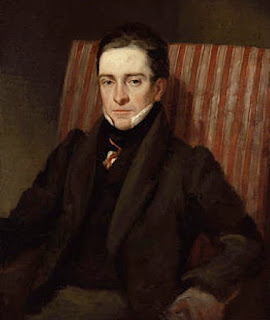No!
No sun - no moon!
No morn - no noon -
No dawn - no dusk - no proper time of day.
No warmth, no cheerfulness, no healthful ease,
No comfortable feel in any member -
No shade, no shine, no butterflies, no bees,
No fruits, no flowers, no leaves, no birds -
November!
Thomas Hood 1844
Dear Emily,
I don't expect you will feel quite the same as Mr Hood did about the month of November, as you don't live in a London that was at that time full of smog. Your central heating also helps.
Thomas Hood was a writer who was chiefly a humourist. Working in a time that as Thomas Carlyle espoused- all the great thinkers were 'in some sense a product of the force that the French revolution had induced'. Dickens took on the mantle of writer about social demographic and deprivation, Tennyson was given the Laureate-ship by Queen Victoria in an effort to lift the public morale and in his turn, Hood was at the birth of satire and pun into popularity via Punch, and before with his own Editorship at 'The Comic Times'.
It seems to me that at this point in history, satirists, parody-makers and even burlesques ( though these by definition had an attitude of aggression towards the quality of the original ) began to fall into two camps.
Hood was described by Henry Morley as having " the kindest wit and satire, jokes pound out incessantly from pen and pencil, supplying the needs of Hood's household, while in himself consumption was not slowly descending ". His socially commendable Song of the Shirt made it into an inaugural edition of Punch in 1843.
At this time, the weekly Art producer was Mr John Tenniel ( of 'Alice' fame.) Hood it seems was part of the same war as Thackeray ( a friend and admirer ) and Punch to lift society through humour. Edward Lear, as we have previously encountered, was nothing but kindly in his public 'nonsense'.
Satire is complex. In 1858, 'Home Affections by the poets' written by Charles Mackay contains a collection of the poetry of love in particular, including five poems by Hood and one in particular hommaging his sleeping children and Wife in an unsycophantic manner. Contrast Walter Jerrold's 'A Century of Parody and Imitation' ( @ 1912 ) which chronologises poems and their parodies by the Grandson of Hood's close friend Douglas Jerrold; which via earlier Shakespearian parody, talks us through the then 'modern' birth of this fancy for him originating on the stage with 'Rejected Adresses' by the naughty Horace and James Smith. The volume is an insight to those who leech for fun, and those who hide behind what satire has always 'pretended' to be about. " The end of satire is reformation" and "sly hints" contribute to the satirists mask of self-protected obscurity. The fine-line was delved into in Victorian times, and still abounds today.
Back to Mr Hood. His early work included a translation of 'Paul and Virginia' by Jacques Henri Bernardin in 1787. Our own Julia Margaret Cameron photographed her version with Freddy Gould ( who lived at the cottage behind the Fellowship hotel visible out of GiGi's window ) and Elizabeth Keown.
Though he died in his forties, his notability secured his wife a pension from Robert Peel ( as did Tennyson. ) Later, in the critical ( for me ) 1860's, so did Tennyson, who often quoted Thomas Hood, and in particular his ' Epigrams'.
My volume for you little Emily, came into my possession from the Bookroom. I opened it, and found the inscription below...
The writing is very much Julia Margaret Cameron, and I like to think that it was given to Annie Thackeray, daughter of William Makepeace Thackeray- friend and admirer of Hood. Annie and Julia certainly were both here that month, their peers all celebrated Mr Hood, so it could just be...
Your ever-loving Grand-mother, GiGi xxx




No comments:
Post a Comment